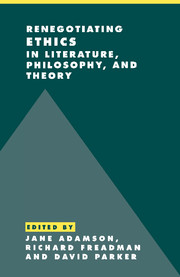Book contents
- Frontmatter
- Contents
- Introduction: the turn to ethics in the 1990s
- I ETHICS, LITERATURE, AND PHILOSOPHY
- II ETHICS AND AGENCY
- III POLITICS AND ETHICS
- 9 Literature, power, and the recovery of philosophical ethics
- 10 The literary imagination in public life
- 11 Ethics in many different voices
- 12 Common understanding and individual voices
- Index
11 - Ethics in many different voices
Published online by Cambridge University Press: 04 February 2010
- Frontmatter
- Contents
- Introduction: the turn to ethics in the 1990s
- I ETHICS, LITERATURE, AND PHILOSOPHY
- II ETHICS AND AGENCY
- III POLITICS AND ETHICS
- 9 Literature, power, and the recovery of philosophical ethics
- 10 The literary imagination in public life
- 11 Ethics in many different voices
- 12 Common understanding and individual voices
- Index
Summary
What difference is the increasing number of women philosophers making to the way ethics gets thought about in philosophy seminars, at philosophy conferences, in the philosophy books and articles now being published? It is making many differences. The new voices that are joining the debate are interestingly various. We should no more expect agreement in views, in method, and in style among women who write on ethics, than we expect to find agreement among male moral philosophers. There are as big and important disagreements between say, J. J. Thomson and Catharine MacKinnon, or Mary Daly and Simone Weil, as there are between Aquinas and Hobbes, or Hume and Kant. Some women moral philosophers dislike being perceived as women philosophers, while others glory in being so perceived; some call themselves ‘feminist’, some refuse that label, and some of us welcome it when others apply it, while having felt no need to proclaim it for ourselves.
It is dangerous to make suggestions about what difference women are making to the ethics getting done in philosophy departments, since any generalisation will be disputed by some women. Male observers down the centuries have seen women as a quarrelsome lot, given to mutual hair pulling and jealous spite, as well as to maternal solicitude and gentle soothing of the hurt feelings of others. We have shown ourselves capable of pandering to male fantasies as well as of having our own alternative fantasies. In philosophy seminars, as in the boudoir, some will prove protective of fragile male egos, others will fulfil the worst male nightmares of the castrating woman by putting some teeth into our philosophical grip on male moral theories.
- Type
- Chapter
- Information
- Renegotiating Ethics in Literature, Philosophy, and Theory , pp. 247 - 268Publisher: Cambridge University PressPrint publication year: 1998



